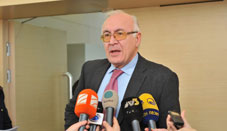
Georgia’s Envoy to Russia Calls for More Dialogue with “Difficult Neighbor”
By Gvantsa Gabekhadze
Wednesday, November 22
(TBILISI) -- Georgia’s Special Envoy to Russia, Zurab Abashidze, has called for increased dialogue with the Kremlin to help tackle many of the thorny issues that continue to sharply divide Moscow and Tbilisi.
Appointed as Georgia’s special envoy to Russia shortly after the ruling Georgian Dream ended the United National Movement’s (UNM) decade-long administration in 2012, Abashidze spoke about the advantages of dialogue with Russia, a country that currently occupies more than 20 percent of Georgia’s internationally recognized territory.
He stated that his regular meetings with Karasin in Prague, once or twice a year, have provided a positive trend for the state economy.
“When we began regular dialogue, our exports to Russia was zero, while all kinds of products were coming from the other side of the border... (The UNM) put no restrictions on Russian imports,” said Abashidze. “One of our main tasks was to resolve this issue…now our annual exports to the Russian Federation amount to about GEL 250 million (USD 92 million); hopefully it will reach GEL 300 million (USD 110 million) by the end of this year.”
Abashidze also announced an upcoming meeting in Switzerland among Georgian, Russian and Swiss officials for the signing of a customs monitoring contract.
“Representatives from the three countries will discuss all of the details of the contract with a Swiss company… the necessary documents will then be signed and the implementation process will begin shortly thereafter,” Abashidze said.
Tbilisi and Moscow severed diplomatic relations following the 2008 Russia-Georgia War. Diplomatic and consular issues between the two countries are currently settled through Swiss envoys.
Georgian and Kremlin officials signed an agreement “On the basic principles for the mechanism of customs administration and the monitoring of trade in goods” in 2011. This was a key precondition for Georgia’s consent to Russia’s accession to the World Trade Organization.
In exchange for Georgia’s consent, Tbilisi demanded control over cargo traffic on the Abkhaz and South Ossetia sections of the border.
The Swiss-based company SGS will monitor cargo traffic between the two rival countries, while acting as a go-between for both Georgia and Russia.


